AARC Provides Comfort and Care From HIV Prevention, HIV Treatment and LGBT Specialty Care

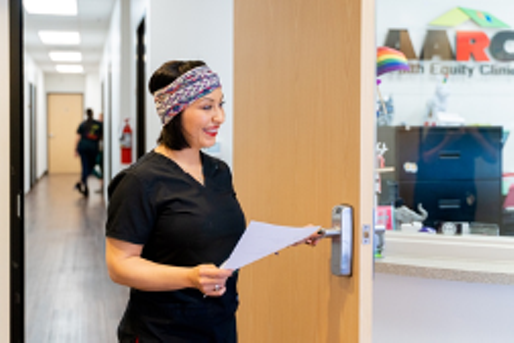
Franco Ulloa was making his rounds as a UPS delivery driver when he saw flags with the rainbow colors of LGBT and the telltale light blue, pink and white for transgender flying at 303 N. Frio St.
As a transgender man who began transition in 2017, Ulloa’s first delivery to the Alamo Area Resource Center was just his first of many visits. He was seeking a change in doctors and soon found a new medical home.
“It just feels different,” says Ulloa, who now has his primary care physician at AARC and receives hormone treatments. “It’s the environment. You walk in there and feel comfortable.”
Comfort. In a world full of uncomfortable situations, especially when it comes to conversations about sexuality and intimate health issues, finding a place where that exists and people who provide a sense of ease is essential.
“They make you feel at home,” Ulloa says. “You’re not a stranger.”
More than 3,000 people from Bexar and surrounding counties turn to AARC as a place of hope and comfort when it comes to LGBTQ primary-care treatment and prevention of HIV and host of other social services for effected communities from the homeless to the well-insured.
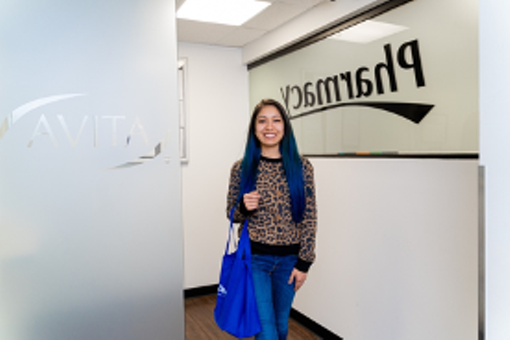
“We started as a grassroots organization in the early 1990s when people were dying from AIDS (the autoimmune disease stemming from the virus known as HIV). There were five or six staffers who often didn’t get paid who were helping people die as comfortably as possible,” says Marissa Espinosa, a nine-year veteran of AARC and its community liaison.
The organization has come a long way since then. The non-profit organization provides 14 services to the broader community and operates a clinic catering to the LGBTQ community with a physician, a physician assistant, two nurses and eligibility staff to help clients through the process.
“The practice of medicine in this country is very heteronormative,” Espinosa says of assumptions that heterosexual relationships and two separate genders are the standard. Even today, medical students only receive a few hours of training in LGBTQ-related health issues, she says.
At AARC, the understanding of those issues starts at the front desk, carries through in dealing with the medical staff and continues with those helping with the paperwork.Enrique Andrade was introduced to AARC after unsuccessfully seeking out the latest in HIV preventive measures in San Antonio for nearly three years. His doctor was unaware of the treatments known as PrEP, or pre-exposure prophylaxis. A friend who happened to work at AARC introduced him the services at the center and Andrade started on the medications, which have since been improved upon by pharmaceutical companies. The medications lower the risk of contracting HIV and lowers the levels of those who are HIV positive to undetectable levels.
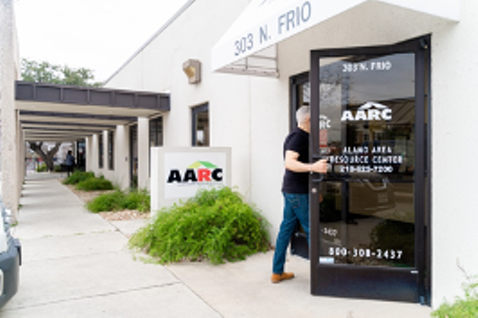
“I was drawn to them because they were very gay friendly and they knew about Truvada,” Andrade said of a PrEP treatment now joined by the next-generation drug Descovy, approved by the U.S. Food & Drug Administration in 2019.
Andrade, a bartender who meets many men in need of AARC services, has become an active advocate for PrEP and overall wellness provided at the center. Sometimes that first hurdle is just to get someone in for testing, he says.
One of those people is Ricky Ruedo, who said he knew little of the health care issues he faced a gay man. “Enrique has gone out of his way to take friends to AARC because they’re afraid,” Ruedo says. He now goes every three to four months and says the center reaches out to people who might miss a scheduled appointment so they’re health doesn’t fall by the wayside.
“People feel more comfortable at AARC because the staff can relate to them,” Ruedo says. “They have the knowledge and they’re able to share it with others. They are also very easy-going in the way of finances,” finding assistance for those who need it.
As a prevention specialist at AARC, Theresa “Kooder” Cantu says the center is so many things to many people including sex and health education, an understanding of LGBT culture and preventing transmission of infectious diseases from syphilis to HIV. Hepatitis B testing also is offered.
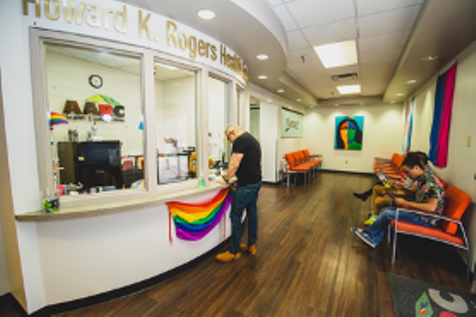
“People need to know they can have a full life with no issues,” says Cantu, whose nickname “Kooder” comes from her drag stage name Kooder Parker before becoming a transgender woman.
Cantu says one of the biggest problems is that most physicians don’t understand the issues of HIV, transgender hormones and other LGBT issues because of bias or lack of training. “The patients don’t open up and the doctor can’t treat because they don’t know what they’re needing to treat. At AARC, they’ll be treated by doctors with the experience and understanding of the community.”
For Leslie Rivera, working as an eligibility intake specialist at AARC, has many of the rewards she found in previous social services jobs. “Social work, in general, is important to me because of the human-to-human interaction,” she says. “It’s rewarding to provide the services that we do.”
The most booked appointments are with the insurance department because treatments are so expensive, Rivera says. After that, there are heavy requests for help with housing issues such as assistance with utilities, rents and job placement.
“We do our best to be a one-stop shop for our clients,” Rivera says.
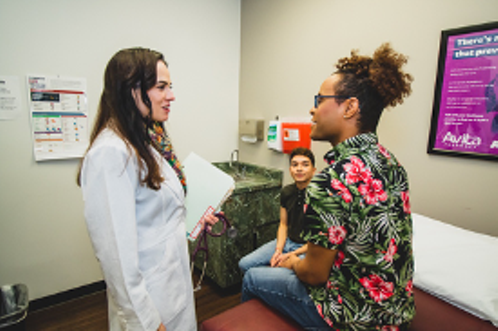
The AARC uses the care model of the famed Johns Hopkins University to help clients, Marissa Espinosa says. That includes providing specialty care, LGBT health, HIV care, and their on-site Avita Pharmacy. In 2019, the AARC had more than 1,600 clients using center resources, more than 400 additional clients using the clinic and over 1,300 tested in the community.
“What we’re doing (in South Texas) is changing medical history,” Espinosa says.
The Alamo Area Resoure Center has implemented COVID-19 safety measures for patients and employees. To learn more visit: https://www.aarcsa.com/covid-19-updates/
















